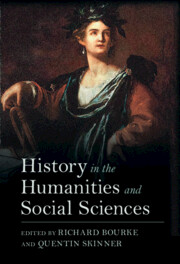Book contents
- History in the Humanities and Social Sciences
- History in the Humanities and Social Sciences
- Copyright page
- Contents
- Figures
- Contributors
- Acknowledgements
- Introduction
- 1 Law and History, History and Law
- 2 History, Law and the Rediscovery of Social Theory
- 3 The Uses of History in the Study of International Politics
- 4 International Relations Theory and Modern International Order: The Case of Refugees
- 5 The Delphi Syndrome: Using History in the Social Sciences
- 6 Power in Narrative and Narratives of Power in Historical Sociology
- 7 History and Normativity in Political Theory: The Case of Rawls
- 8 Political Philosophy and the Uses of History
- 9 The Relationship between Philosophy and its History
- 10 When Reason Does Not See You: Feminism at the Intersection of History and Philosophy
- 11 On (Lost and Found) Analytical History in Political Science
- 12 Making History: Poetry and Prosopopoeia
- 13 Reloading the British Romantic Canon: The Historical Editing of Literary Texts
- 14 Economics and History: Analysing Serfdom
- 15 The Return of Depression Economics: Paul Krugman and the Twenty-First-Century Crisis of American Democracy
- 16 Anthropology and the Turn to History
- Index
- References
7 - History and Normativity in Political Theory: The Case of Rawls
Published online by Cambridge University Press: 08 December 2022
- History in the Humanities and Social Sciences
- History in the Humanities and Social Sciences
- Copyright page
- Contents
- Figures
- Contributors
- Acknowledgements
- Introduction
- 1 Law and History, History and Law
- 2 History, Law and the Rediscovery of Social Theory
- 3 The Uses of History in the Study of International Politics
- 4 International Relations Theory and Modern International Order: The Case of Refugees
- 5 The Delphi Syndrome: Using History in the Social Sciences
- 6 Power in Narrative and Narratives of Power in Historical Sociology
- 7 History and Normativity in Political Theory: The Case of Rawls
- 8 Political Philosophy and the Uses of History
- 9 The Relationship between Philosophy and its History
- 10 When Reason Does Not See You: Feminism at the Intersection of History and Philosophy
- 11 On (Lost and Found) Analytical History in Political Science
- 12 Making History: Poetry and Prosopopoeia
- 13 Reloading the British Romantic Canon: The Historical Editing of Literary Texts
- 14 Economics and History: Analysing Serfdom
- 15 The Return of Depression Economics: Paul Krugman and the Twenty-First-Century Crisis of American Democracy
- 16 Anthropology and the Turn to History
- Index
- References
Summary
John Rawls offers an instructive case study in how we have come to think about the relationship between historical conditions and moral standards in political philosophy. He is commonly taken to have rejuvenated political theory, though it makes more sense to see his work as an important development within ethics which was subsequently presented as the rebirth of political philosophy. The essence of Rawls’s thought is to be found in his construction of ideal values for whose practical viability he then argues. The venture, he claimed, was ‘realistically utopian’. But his emphasis fell on the theoretical justification of the construction rather than on the conditions of its practical viability. This parallels certain tendencies within economic theory where abstract modelling takes on a life of its own. But the nearest precedent for this procedure in the history of moral thought is Kant’s practical philosophy. Rawls saw the Kantian moral commonwealth – or kingdom of ends – as the structural equivalent of his own commitment to true democratic justice. The divergence, however, between their ideas is at least as significant as any appearance of overlap. Kant was profoundly sceptical about the moral capacities of human beings and projected his ideal as a goal to be actualised in the remotest future of a protracted world historical process. Moreover, forward momentum towards this end was to be driven by selfishness and competition rather than by an abiding devotion to the principles of justice. Rawls’s project is radically distinct from this vision. While paying scant attention to the historical conditions that might favour justice as fairness, he thought that a just regime would be realised through moral striving. Moreover, he claimed that progress since the Reformation had brought this outcome within reach.
Keywords
- Type
- Chapter
- Information
- History in the Humanities and Social Sciences , pp. 165 - 193Publisher: Cambridge University PressPrint publication year: 2022



